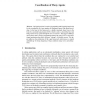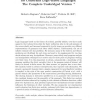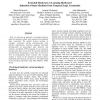101 search results - page 9 / 21 » CLP(BN): Constraint Logic Programming for Probabilistic Know... |
ACL
1997
13 years 10 months ago
1997
In this paper we describe an approach to constraint based syntactic theories in terms of finite tree automata. The solutions to constraints expressed in weak monadic second order ...
ICLP
2005
Springer
14 years 2 months ago
2005
Springer
This paper presents a reactive programming and triggering framework for the coordination of a large number of distributed agents with shared knowledge. At the heart of this framewo...
IJCAI
2007
13 years 10 months ago
2007
A formula in first-order logic can be viewed as a tree, with a logical connective at each node, and a knowledge base can be viewed as a tree whose root is a conjunction. Markov l...
CORR
2004
Springer
13 years 9 months ago
2004
Springer
Logic languages based on the theory of rational, possibly infinite, trees have much appeal in that rational trees allow for faster unification (due to the safe omission of the occ...
EH
1999
IEEE
1999
IEEE
Evolvable Hardware or Learning Hardware? Induction of State Machines from Temporal Logic Constraints
14 years 1 months ago
Here we advocate an approach to learning hardware based on induction of finite state machines from temporal logic constraints. The method involves training on examples, constraint...



